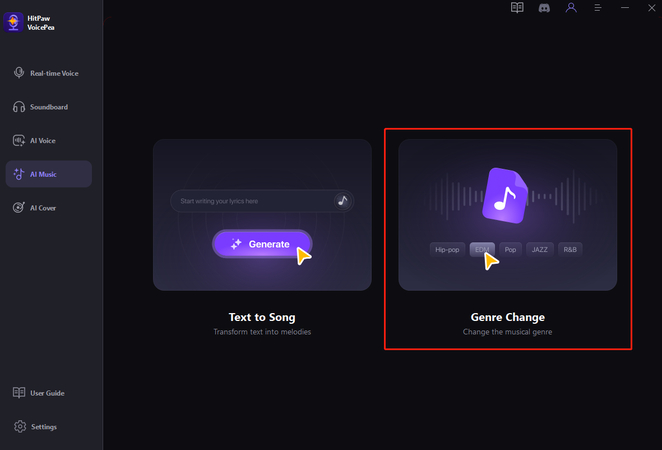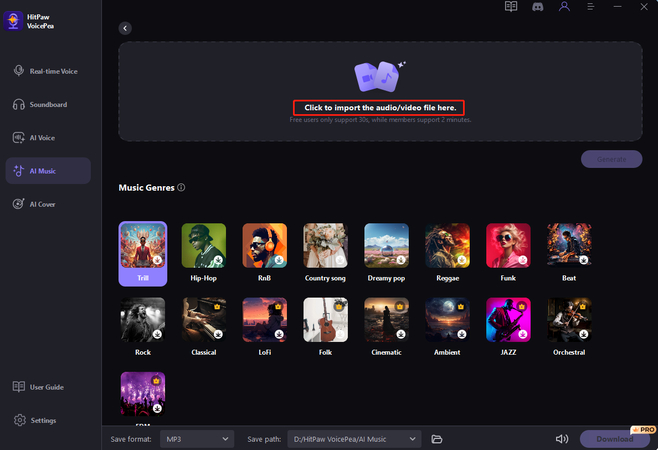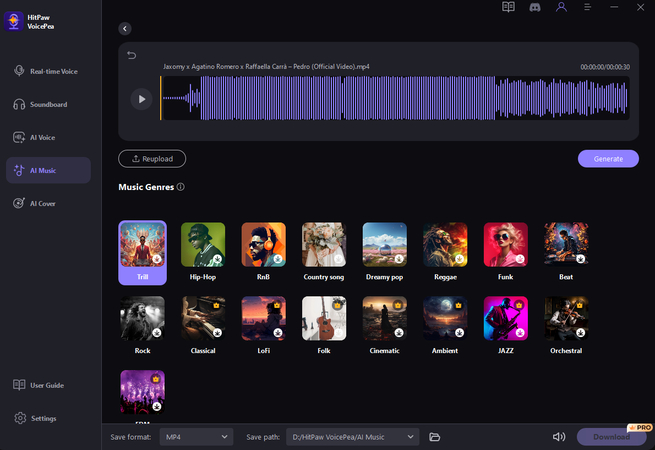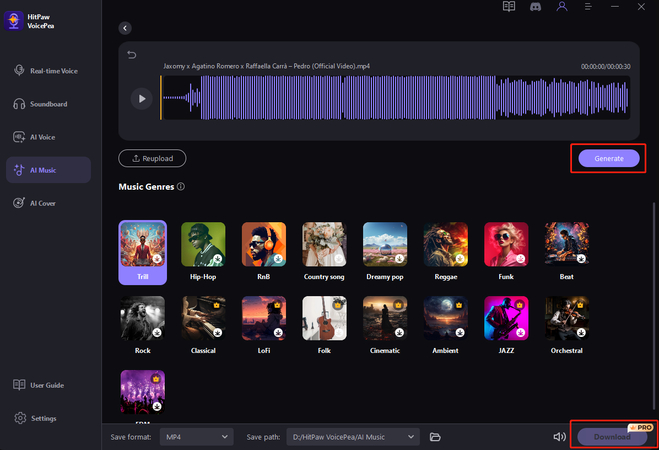Tone Deaf Test: Online Tools, Tips & AI Music Solution
Tone deafness is the difficulty in distinguishing between different musical pitches. People who are tone deaf may find it challenging to sing in tune or recognize whether a note is higher or lower than another. A tone deaf test is an assessment designed to check a person's ability to identify musical notes and pitches. Many people take a tone deafness test to understand their musical abilities or weaknesses. Today, there are multiple ways to take a test for tone deafness, including online platforms, mobile apps, and interactive tools.
Part 1: Why Take a Tone Deafness Test?
Taking a tone deafness test has several benefits. First, it helps you know your strengths and weaknesses in music. Knowing the results can guide your singing practice, music learning, or confidence in performing. It is important to understand the difference between true tone deafness, called amusia, and a lack of musical training. Most people who fail a tone deaf test are not genuinely tone deaf-they simply need more practice in listening and identifying pitches. Taking a test for tone deafness can also guide beginners in choosing the right approach to learning music.
Part 2: Best Online Tone Deaf Test Tools
Finding the right online tone deaf test is important for accurate results. Here are some of the best tools available today:
1. Harvard's Online Tone Deaf Test
Harvard University offers a trusted tone deafness test online that has been widely used in music perception research. It plays sequences of musical notes and asks you to decide whether the notes are the same or different. It is one of the most reliable online tone deaf tests because it is backed by academic research and detailed scoring.
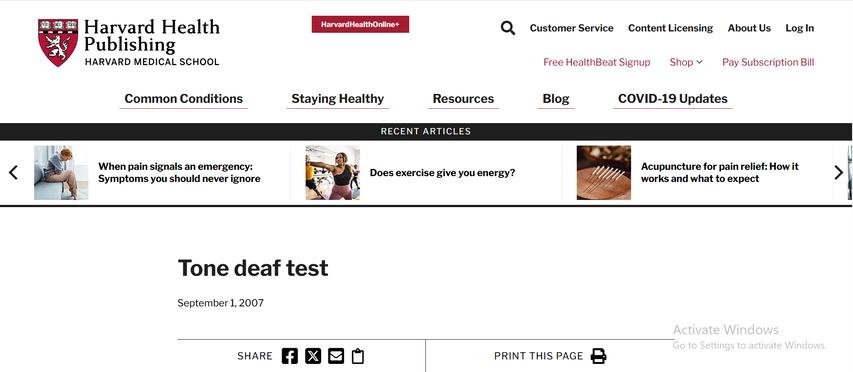
Pros:
- Accurate and research-based, providing reliable pitch recognition results.
- Free to use for anyone with internet access.
- Gives detailed feedback to help understand musical abilities.
Cons:
- Can feel technical for beginners unfamiliar with musical terms.
- Requires focus and a quiet environment to get accurate results.
- No mobile app version; only available on desktop browsers.
2. Tone Deaf Tester Apps (iOS & Android)
Tone deaf test apps are mobile-friendly tools available for both iOS and Android devices. They let users test their pitch recognition anytime by listening to notes or melodies and identifying whether they are correct. Some apps also offer tracking of your results over time and exercises to help improve pitch perception. These apps are convenient for people who want a portable tone deaf test app that they can use anytime, anywhere, and get quick feedback on their musical ear skills.
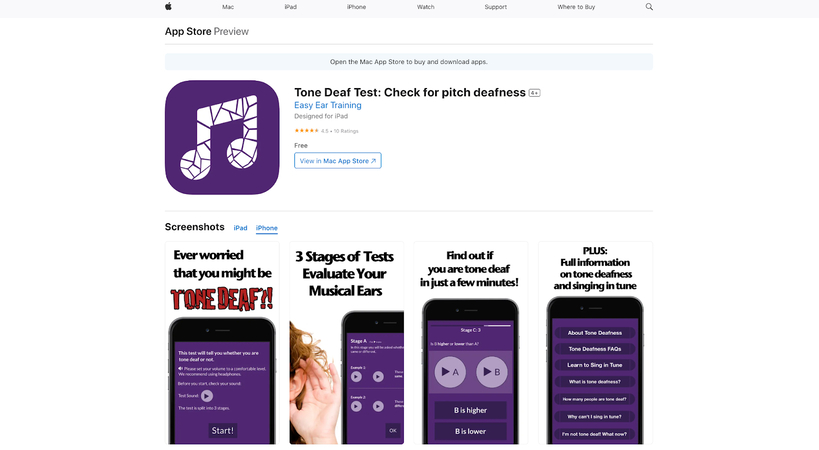
Pros:
- Portable and convenient to use on mobile devices.
- User-friendly interface that is easy to navigate.
- Some apps include progress tracking for improvement over time.
Cons:
- App quality varies; some may give less accurate results.
- Full access may require paid features or subscriptions.
- Results are sometimes less precise than research-based online tests.
3. Musical U Tone Deafness Test
Musical U provides a beginner-friendly tone deafness test online for quick and simple pitch assessment. Users listen to notes and determine if they are the same or different. It is ideal for those who want a fast tone deaf test without complicated instructions. The test offers immediate feedback, showing whether your ear is sensitive to pitch differences or if more practice is needed.
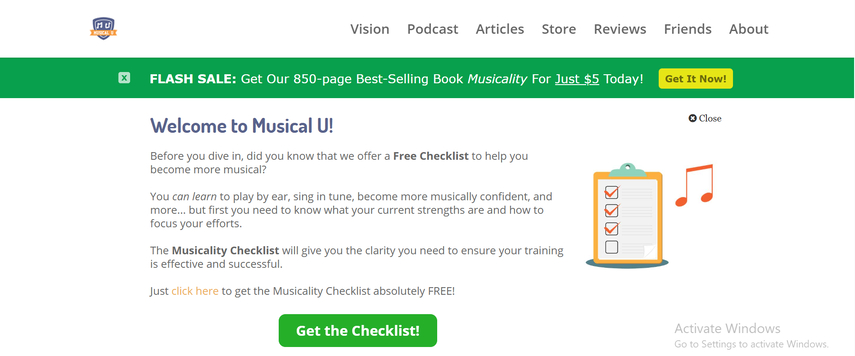
Pros:
- Easy to use, requiring no previous musical experience.
- Provides quick results so users can understand their abilities.
- Accessible online without needing downloads or apps.
Cons:
- Less comprehensive than academic tests like Harvard's.
- Feedback is basic and not very detailed.
- Some features require a paid subscription for advanced testing.
4. SingTrue App
SingTrue is a tone deaf test app that combines testing with training exercises. It helps users not only check if they are tone deaf but also practice to improve pitch recognition and singing accuracy. The app plays sequences of notes, guides you through exercises, and shows improvement over time. This tool is perfect for beginners or anyone who wants to develop their musical ear while testing their abilities using a tone deaf test app.
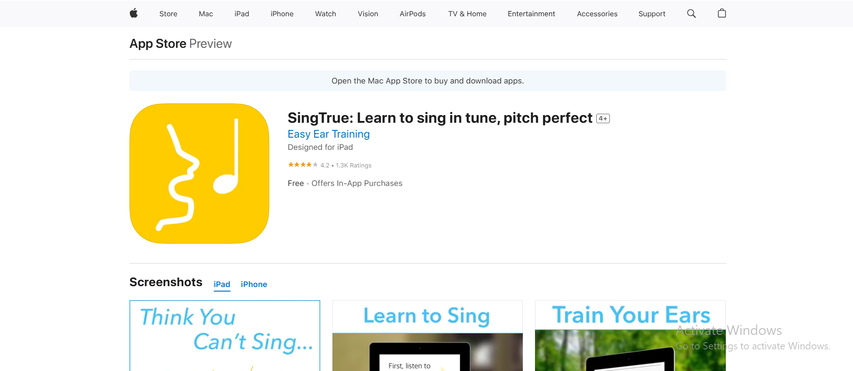
Pros:
- Helps improve pitch recognition, not just test it.
- Includes interactive exercises for practice and learning.
- Mobile-friendly and convenient to use anywhere.
Cons:
- Some exercises and features are behind a paywall.
- Requires consistent use to see noticeable improvement.
- Takes time and patience to get results compared to quick tests.
Part 3: Tips for Taking a Tone Deaf Test
To get accurate results in any tone deafness test, follow these tips:
- Find a quiet environment: Background noise can affect your results.
- Use quality headphones or earphones: This ensures clear pitch recognition.
- Don't rush: Take your time with each note and focus on the sound.
- Try multiple tools: Using several tone deaf test apps or websites gives a more reliable outcome.
- Keep perspective: Most people are not truly tone deaf; they may just need practice.
By following these tips, you can make sure your tone deaf test results are as accurate as possible and get a clear understanding of your musical abilities.
Bonus Tip: Tone Deaf Test Doesn't Stop You-Try AI Music Generator
Even if you score poorly on a tone deafness test, it doesn't mean you can't enjoy creating music. Modern tools like the HitPaw VoicePea AI Music Generator make it easy for anyone to compose songs without needing advanced musical skills. With this AI-powered tool, you can generate melodies, transform voices, and even turn text into music. It is a perfect solution for those who struggle with pitch recognition or feel unconfident after taking a tone deaf test. Using this tool, anyone can explore music creation and produce songs quickly and easily, regardless of their results.
Features:
- Free AI Music Generator for Everyone: Create music easily without worrying about royalties.
- Select Your Favorite Music Styles: Choose from different genres to match your creative ideas anytime.
- AI-Powered Voice Enhancement: The AI makes melodies and voices sound more natural and lively.
- Create and Download Music Quickly: Generate unique AI music and save it in just one click.
Steps to Create AI Music with HitPaw VoicePea:
Step 1.Click on "AI Music" from the left sidebar and choose the "Change the musical genre" option.

Step 2.Click to upload your audio or video file. HitPaw AI Music Generator accepts a wide range of formats. For audio, it supports formats like mp3, wav, aac, flac, ogg, m4a, wma, and more. For video, you can upload files in mp4, mov, avi, mkv, flv, wmv, mpg, mpeg, ts, webm, and many other formats.

Step 3.Choose your preferred genre from the list. You can also click on each genre to preview it before applying.

Step 4.After selecting the genre, wait a few seconds for the tool to process your file. Once it's done, your music will be ready. To download the result, you'll need to join as a member.

Conclusion
A tone deaf test helps you understand your ability to recognize musical notes and pitches. Using online tone deaf tests and mobile tone deaf test apps makes it easy to check your musical ear. While some people may struggle with pitch recognition, tools like the HitPaw VoicePea AI Music Generator ensure everyone can create music, regardless of the test results. Taking a tone deafness test is the first step toward learning more about music, gaining confidence, and even enjoying music creation through AI tools. So, whether you are checking your skills or just curious, online tone deaf tests are simple, accessible, and helpful.
Leave a Comment
Create your review for HitPaw articles







